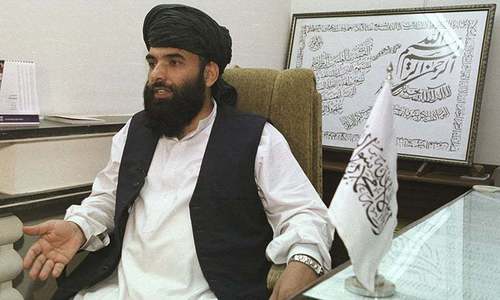WASHINGTON: The United States, Russia and China have agreed to persuade Afghanistan’s neighbours to support a consensus strategy for ending the Afghan war, the three major powers said in a joint statement on Saturday.
In Washington, the US State Department issued a copy of the joint declaration, stating that the United States, Russia and China reached a consensus at a meeting in Moscow this week on how to end the 18-year-old war.
Read more: 'Nothing is agreed until everything is agreed': US envoy on 'progress' of US-Taliban talks
The document calls for the withdrawal of all foreign forces from Afghanistan and seeks an “inclusive Afghan-led” peace process.
The document also notes Taliban’s “commitment” to fight the Islamic State extremist group and to break ties to Al Qaeda and other terrorist outfits. The paper highlights Taliban’s pledge to “ensure the areas they control will not be used to threaten any other country”.
“The three sides call for regional countries to support this trilateral consensus and are ready to build a more extensive regional and international consensus on Afghanistan,” the statement added.
US special envoy for the Afghan peace process, Zalmay Khalilzad, met his Russian and Chinese counterparts in Moscow on Thursday and the talks led to the joint statement, underlining the need to build international consensus for ending the Afghan war.
“The three sides call for an orderly and responsible withdrawal of foreign troops from Afghanistan as part of the overall peace process,” the joint statement said. “The three sides support an inclusive Afghan-led, Afghan-owned peace process and are ready to provide necessary assistance.”
The US decision to seek Russia and China’s support for the Afghan peace process follows Taliban’s continued refusal to negotiate with the Afghan government. As Washington had expected, the trilateral statement “encourages” the Taliban to speak “as soon as possible” with a “broad, representative Afghan delegation that includes the government”.
Last week, Taliban refused to meet a 350-member Kabul delegation, which also included 50 women, saying that it was too large. Taliban had only had 10 representatives in Doha, Qatar, where the talks were scheduled.
Taliban negotiators also insist that the next round of talks should focus on the withdrawal of foreign troops while the US wants the insurgents to declare a ceasefire first to allow a peaceful and orderly withdrawal.
In the joint statement, the United States, Russia, and China also agreed to support a second round of intra-Afghan dialogue in Doha and to back the Afghan government’s efforts to combat international terrorism and extremist organisations in Afghanistan.
They urged Taliban to prevent terrorist recruiting, training, and fundraising, and expel any known terrorists.
The three sides agreed on a phased expansion of their consultations before the next trilateral meeting in Beijing.
Published in Dawn, April 24th, 2019
















































